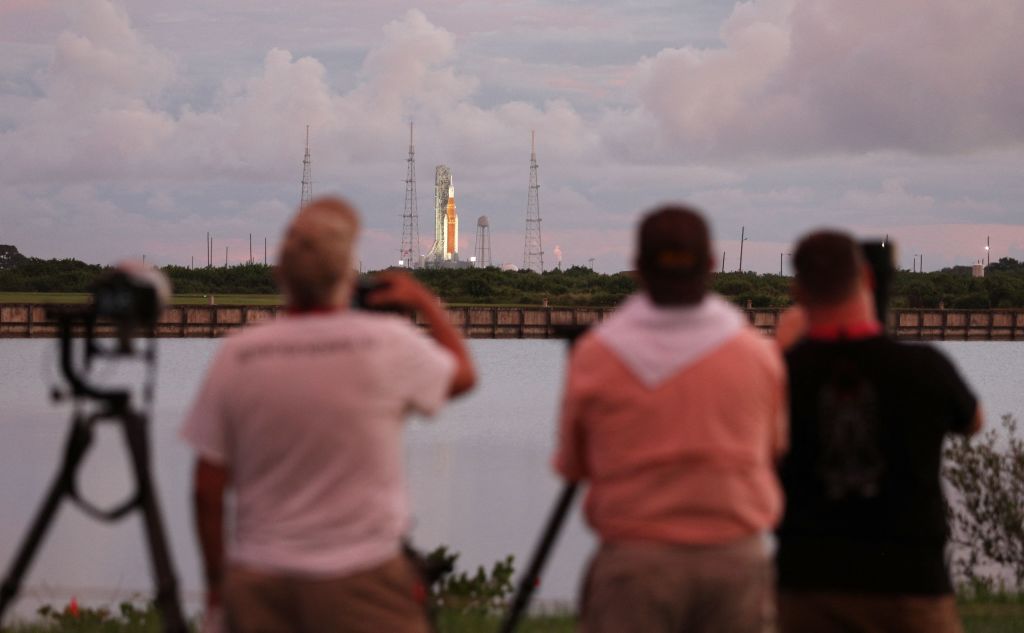The unmanned test launch of the Artemis I set for Monday will see the most powerful American rocket since the 1970s carry an unmanned Orion module to the moon and back.
During the 42-day voyage, NASA will flight-test the critical components of the Space Launch System as well as the integrated spacecraft/payload element and the Orion module that will carry astronauts to the moon in the coming years.
The project has not come cheap. NASA’s Inspector General Paul Martin warned Congress in March that Artemis had already cost $40 billion, with NASA projected to spend $93 billion on the Artemis effort through 2025, and is so far delayed that a manned mission is “likely will slip to 2026 at the earliest,” according to CNBC.
According to CBS and the NASA SLS Reference Guide, the massive launch system is constructed from leftover space shuttle components joined to a modified upper stage borrowed from another rocket. Artemis will issue forth from launch pad 39B at Cape Canaveral with 8.8 million pounds of thrust from 25 percent more fuel than the shuttles ever carried.
There is a really big rocket on the launchpad heading to the moon on Monday! Go @NASAArtemis!! Go @NASA_SLS!! Go @NASA_Orion!! pic.twitter.com/LjxXGt60Gf
— Mike Massimino (@Astro_Mike) August 26, 2022
NASA Administrator Bill Nelson told CBS News he’s afraid people with think Monday’s launch is routine.
“But when those candles light off, it’s anything but routine. It is high-wire act all the way up. … This is a big deal. And it is beautiful. And it is a monster! The size just overwhelms you.”
According to CNN, the weather is one of the largest considerations in whether Artemis 1 will launch on Monday or if the already delayed and over-budget mission will be pushed back yet again.
We are ready. ?
In just five days, the first launch opportunity of the integrated @NASA_SLS rocket and @NASA_Orion spacecraft will take place. The uncrewed #Artemis I mission around the Moon will pave the way for future crewed missions and begin a new chapter of exploration. pic.twitter.com/fT1tMiGjeb
— NASA Artemis (@NASAArtemis) August 24, 2022
Mark Burger, the US Air Force launch weather officer at Cape Canaveral, explained, “Roughly 16% of every launch attempt we have at Cape Canaveral gets scrubbed due to weather,” he said. “Roughly 23% of all the countdowns have some sort of weather consideration.”
Burger told CNN that the $50 billion mega-rocket could be stopped by even a single cumulus cloud appearing within 10 nautical miles of its flight path.
“It’s more than just simply the lightning bolt that you see yourself, but also the capacity of each cloud to potentially carry a charge when you launch a rocket,” Burger said. “It could trigger lightning on its own.”
NASA, in a coordinated effort to return astronauts to the moon for the first time since the Apollo 17 mission in 1972, began the development of the Artemis program in 2017 under President Donald Trump.
[firefly_embed]
[/firefly_embed]
Since the program’s announcement on December 11, 2017, it has faced several challenges and even pushes for cancellation.
Trump notably had to push for an additional $3.3 Billion in 2020 for the development of a lander. Many Washington insiders were impressed that the costly program survived a transition to the Biden-Harris administration that saw almost every other Trump initiative slashed within the first few days.
President George W. Bush had set the goal to return Americans to the moon in the early 2000s, a goal that President Obama walked back, shifting the focus to Mars. The lunar program was resurrected by Trump and carried onward by Biden.
Christian Davenport at The Washington Post wrote that while “many in the space community thought the Trump administration’s goal to land astronauts on the moon by 2024 was impossible and politically motivated, it gave the program momentum.”
[firefly_embed]
[/firefly_embed]
“And many at NASA were worried that the Biden administration, which said virtually nothing about space during the campaign, would change course again, continuing a record often compared to the scene in the cartoon strip “Peanuts” when Lucy pulls the football away just as Charlie Brown is about to kick it,” he added.
But in this unique scenario, it seems that two of the most bitterly and diametrically opposed presidents in American history can at least agree on one thing: The Artemis is “Go for launch.”
This article appeared originally on The Western Journal.

























 Continue with Google
Continue with Google